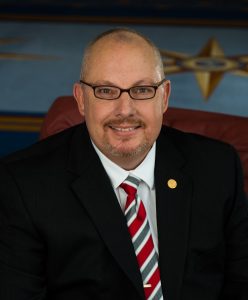This article is part of a series focusing on individuals who dedicate their careers to serving the public in honor of Public Service Recognition Week.

David is an ambassador for American Military University (AMU). He has a master’s degree in business administration from AMU.
What inspired you to pursue this career?
I was selected as a 2013 Presidential Management Fellow (PMF). The PMF program is an entry-level leadership development program for candidates with advanced professional or graduate degrees. The President created it over 30 years ago by executive order. It’s experienced many changes over the years.
The program chooses the best candidates possible, but it is really intended to develop the next group of government leaders. It provides financial support during the first years of employment and encourages PMFs to develop leadership capabilities.
The PMF program creates a lasting bond to your university and a spirit of public service. It’s meant to encourage PMFs to enter a career in government.
What do you wish you knew before going into this field?
I wish I’d known I was going into the financial field. My M.B.A. from AMU is in marketing and I’ve used my marketing skills successfully in my current field.
What is the most satisfying and/or enjoyable part of your career?
I’m part of a small team that administers $1.9 billion in Congressional appropriations for an institute that conducts, supports and coordinates medical research. Our research is on many of the most serious diseases affecting public health.
Is there a moment or incident that you reflect upon fondly as being highly representative of why you pursued this career in the first place?
During my first five months as a PMF, I had an opportunity to detail at the NIH Clinical Center, America’s research hospital, here on the NIH campus. My detail involved a broad range of administrative and programmatic areas, including budget and finance, communications, and program and management analysis. I made rounds with world-renowned doctors and researchers, but the patients really touched me.
Many patients came to the Clinical Center as a last hope in finding a cure or relief from their disease. They came from all around the world, and it was then that I realized how important our mission was. This started my passion for my career.
Since I was not in the health field, I considered what I could do to set up our medical field for success. Everything comes down to one thing: money. I decided then that a career in finance, where I could bring a business discipline to the medical world, would be a right fit for me.
How does (or what) impact does your work have on American citizens?
Americans benefit because NIH is the largest public funder of biomedical research in the world. NIH invests more than $30 billion in taxpayer dollars to achieve its mission to enhance health, lengthen life, and reduce illness and disability.
In pursuing this mission, NIH improves health by promoting treatment and prevention and contributes to society by driving economic growth and productivity. It expands the biomedical knowledge base by funding cutting-edge research and cultivating the biomedical workforce of today and tomorrow.
What advice would you give others pursuing a similar career?
Reach for the stars. Though I started in marketing, I ended up in finance and budgeting. I didn’t limit my skills to just one area. I decided that I could take my marketing skills and use them in the budget and finance fields.
A lot of people said I would never go to college and that I was past my prime because I had a career in the Army. That fueled my desire even more to prove them wrong. As I look back, it is exactly why I am where I am today.
How has the university assisted you in your current position?
I learned business problem-solving skills from my professors and classmates while I obtained my B.A. and M.B.A. at AMU. I use those skills every day. Taking the classroom to the workplace and seeing firsthand how I could approach problems in different ways was very valuable to me.
I have been able to take complex problems and create simple solutions that stakeholders use to make their job easier. These skills and the education I received at AMU helped me to be chosen as a Presidential Management Fellow, which led to my current position at NIDDK.
You are never too old to learn and seek your dreams. AMU gave me that chance.
Did your classroom experience prepare you for your role in this field?
My AMU classroom experience taught me to work in a team and come up with creative solutions to complex problems. When you are not in that brick-and-mortar environment, it encourages you to think out of the box, to explore, and find answers on your own to bring back to the group.
I still do that today in my current career. When I deal with complex or challenging financial issues, the first items I think about are, “Can I do this easier and smarter? Can I find a solution that makes someone else’s job easier?”
I love setting people up for success. I attribute that character trait to my public service in the Army and now the federal government.
What public service means to me is that I can wake up every morning and know that I will touch the lives of millions of people with the work I do at NIDDK and the NIH. There is nothing that beats that feeling of service and knowing that I did my part.

Comments are closed.